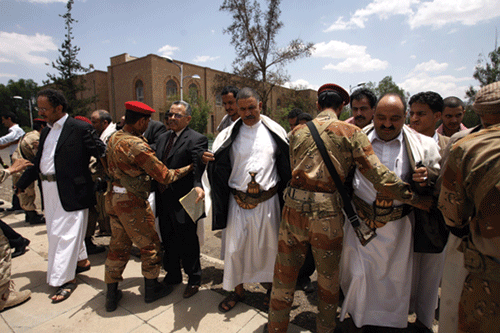Embattled Yemeni President Ali Abdullah Saleh, still in Saudi Arabia recovering from a June bomb attack in Sanaa, has been delivering speeches to his supporters back home promising a swift return to Yemen. His messages have raised fears that his return will lead the country to a civil war— a justifiable concern. In reality, whether Saleh comes back or not is not Yemen’s biggest question today. Even if he returns and refuses to relinquishpower, the post-Saleh period is imminent.
With this is in mind, the country’s opposition groups have been piecing together differing frameworks for a transfer of power. On July 16, coalitions of Yemeni youth in “change square” in Sanaa — groups created amid months of daily protests and sit-ins against the Saleh regime — established a Transition Council of 17 national figures from various groups to rule the country and “[put] an end to Saleh’s regime”.
The youths’ measure was followed by the formation of a“National Council” a few days later by the Joint Meeting Parties (or JMP, established in 2006 by the main opposition political parties in the country), which declared that discussions were taking place between the JMP and other opposition actors to establish a comprehensive transition council representative of the different actors in the opposition and political movements from around the country.
Thus, “The National Council for Peaceful Revolution Forces” was formed after some debate and was originally comprised of 143 members from different political groups: the JMP, opposition actors abroad, al-Houthis, the Southern movement, and religious, military, tribal and civil society leaders. As comprehensive as its intentions may have been, the council quickly ran into discord. The Houthi movement declined to participate, citing a lack of representation, while 23 high-profile members from the South withdrew, namely because they wanted seats on the national transitional council to be split 50-50 between the southern and the northern provinces — this, despite the overwhelming population majority in the north. They also griped at having been named to the council without first being consulted, a common refrain indicative of the larger criticism of the opposition: the lack of strategic planning and coordination. The councils have put the opposition’s boot to Saleh’s neck and begun the process of transitional dialogue, but they have failed to put forward a viable plan for a transfer of power or to reconcile differences between opposition groups.
Since the establishment of the councils by the “youth”, and the JMP and its alliances, nothing has really changed on the ground. The regime still holds power, the security forces continue to attack protesters and the political and economic crises worsen by the day. More importantly, the councils do not enjoy any international recognition; at least not yet.
Whether an interim government will be in power for months, a year or longer, at some point elections will have to be held and new actors will come to power in Yemen. Of principal concern on this matter is the real chance that it would be the Islamists who emerge on top, and, if this does happen, what their makeup might be.
The Yemeni branch of the Muslim Brotherhood, the Islah Party, would be most likely to attract popular support, as the strongest political party in the country. But it is a divided congregation, with three groups making up its core: the Salafists, a smattering of tribes, and the Ikhwan, with the latter known to be the most pragmatic and least ideologically driven. The main concerns are regarding Salafists, led by Abdul Majeedal-Zandani, an extremist religious leader once classified as a “specially designated global terrorist” by the US Treasury Department. Zandani announced more than a month ago that he is pro-Islamic Caliphate, while declaring a“government by the people and for the people is a concept for infidels”. And in 2007, he opposed the appointing of a woman to the Shura Council.
The Islah party has been increasingly realizing that Zandaniis costing the party more than he is helping it, and had already begun minimizing his role, albeit unofficially, even before the uprisings started. The fear of Zandani’s role and the Islamists in general is more an exaggerated phobia than reality; it is anathema for Yemenis to accept a new dictatorship under any justification, even a religious one.
Still, without a better organized, more unified effort from opposition parties to replace Saleh via political means, the question will remain: a transition council to what?
This article was published on the Executive
And when my cover is designed, the designer https://essay4today.com/ will automatically add a bar code to the back of the book, next to the isbn.








